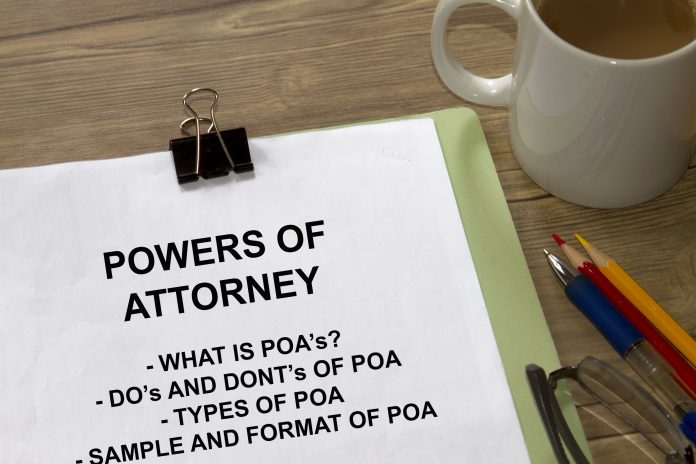A durable power of attorney, or DPOA, is a legal document designed to protect aging parents’ independence and decision-making, while also simplifying the eventual transition to elderly care. A durable power of attorney also serves as a safety net in the event of possible physical or mental incapacitation, ensuring that a trusted appointee has the legal right to make important decisions on behalf of another individual.
For aging adults, a DPOA provides peace of mind in knowing that someone they trust will carry out their wishes related to legal and financial matters, as well as medical decisions (provided a healthcare proxy is implemented) should they become unable to communicate their wishes directly.
A DEFINITION OF POWER OF ATTORNEY
A power of attorney (POA) is a legal document that authorizes someone to act on another’s behalf. The authorizer (ex. your parent) is known as the “Principal,” while the authorized person (ex. you) is known as the “Agent” or “Attorney-in-Fact, or “AIF” (note: the AIF is not required to be an actual attorney). The Agent is approved to carry out certain actions, as outlined in the POA legal document.
A POA may be limited (restricted to certain powers) or broad, and can be established for a specified period of time or marked by a specified start or endpoint (ex. begin upon incapacitation, or end at death).
THE DIFFERENCE BETWEEN A STANDARD POA AND A DURABLE POA
There are two general classes of POA: non-durable vs. durable powers of attorney. If not explicitly designated as durable, a non-durable power of attorney is usually established for one, specific transaction or period of time, and ends when the Principal becomes incapacitated.
A durable power of attorney (DPOA), on the other hand, is much more comprehensive – in other words, a durable POA is usually not limited to a specific transaction – and as its name implies, is durable: it remains in effect, even after the Principal is declared incapacitated.
HOW DURABLE POWER OF ATTORNEY WORKS
Like a trust or other similar document, a durable POA can be written to begin immediately, or to start only after a certain trigger event, such as when an elderly parent is legally declared incapacitated. For the latter case, your elderly parent would be in full control of his or her own medical, financial and other legal decisions, until declared either physically or mentally incapacitated.
DOES YOUR LOVED ONE NEED A DURABLE POWER OF ATTORNEY?
Because of its legal “durability,” a durable POA is an important tool in caring for elderly parents, as well as for general estate planning. As such, a durable power of attorney can (and should) be established well in advance of its necessity.
If a durable POA is not established prior to a declaration of incapacity, a guardianship proceeding in court is often required. Notably, guardianship proceedings can be time-consuming and are more expensive than setting up a durable POA – just another reason to establish a DPOA before it is required.
GENERAL POA VS. FINANCIAL POA VS. MEDICAL POA
A general power of attorney, also known as a financial power of attorney, is what most people think of when they hear POA: it gives the Agent the power to act on the Principal’s behalf in various legal matters – everything from filing taxes to real estate closings, to securing legal documents. A financial POA is very useful in the case of elderly parents, as it empowers the Agent to conduct everyday transactions, like paying bills or filing insurance claims.
A general or financial POA does not cover medical decisions. For that, you’ll need to establish a separate medical power of attorney, also called a healthcare proxy. A medical POA names the Agent responsible for medical decisions, but only goes into effect when the Principal is no longer able make his or her healthcare preferences known; for example, when under anesthesia, or unconscious, or in more long-term situations, like mental incapacitation.
General and medical POAs are often established separately, to give aging parents better control over their interests and wishes. And often, these separate POAs are held by two different Agents, to designate the right person for each job (ex. a healthcare proxy can entail very difficult decisions) and to prevent conflicts of interest.
HOW TO SET UP A DURABLE POWER OF ATTORNEY
Powers of attorney are common legal documents, and at most require a visit to your family attorney’s office; cost will depend on your lawyer’s hourly rate. Likewise, you can also establish your POAs through readily available legal websites, which cost in the $20-$150 range, depending on inclusions (e.g., do you need just a DPOA, or also a living trust, living will, and other related documents?).
However, note that many states, Legal Aid offices, elder legal services offices, and POA websites have made DPOA forms available free online; you need only download the POA form for your state, fill in your details and have the document notarized. That said, most experts advise seeking the aid of a qualified elder care attorney to ensure that a DPOA document is valid and will be legally recognized.

























